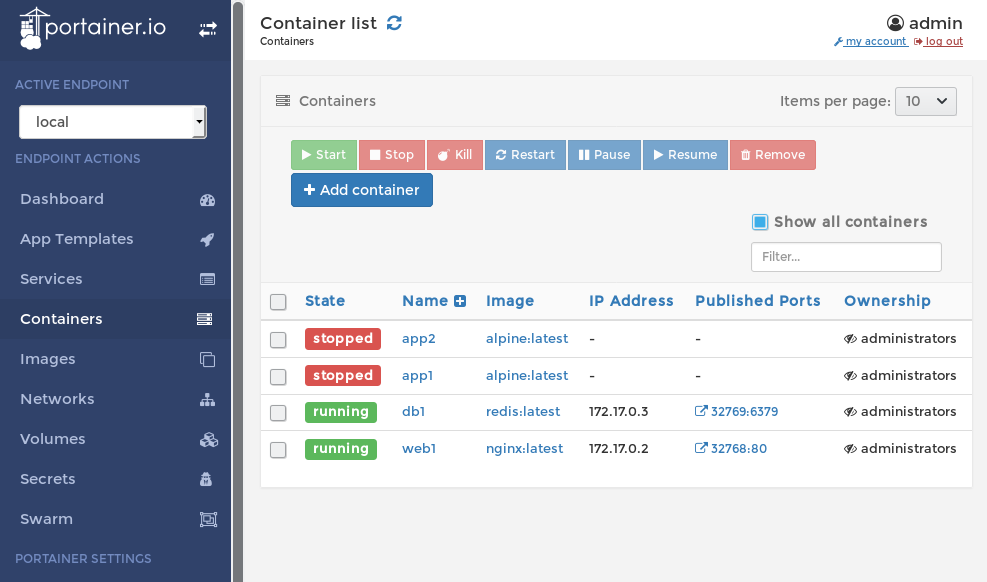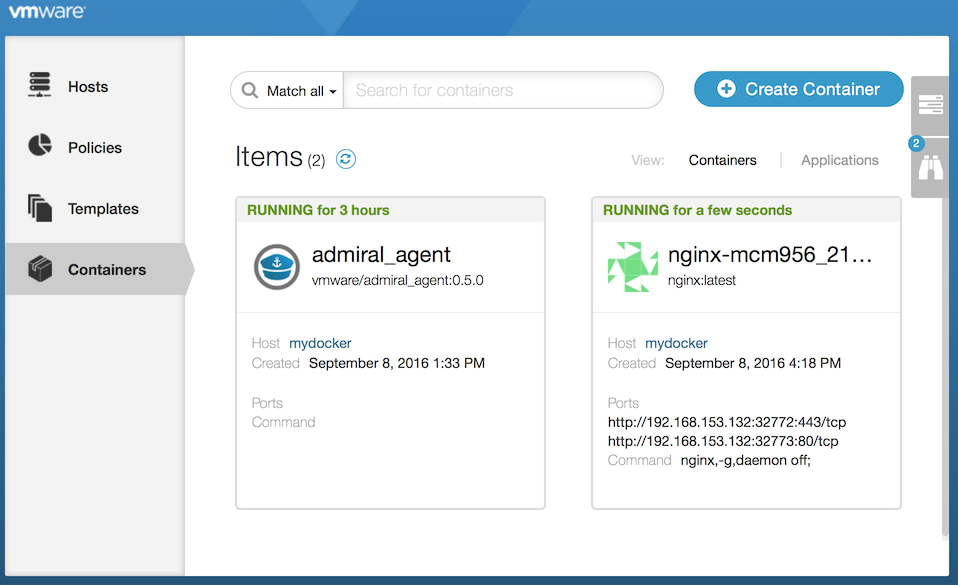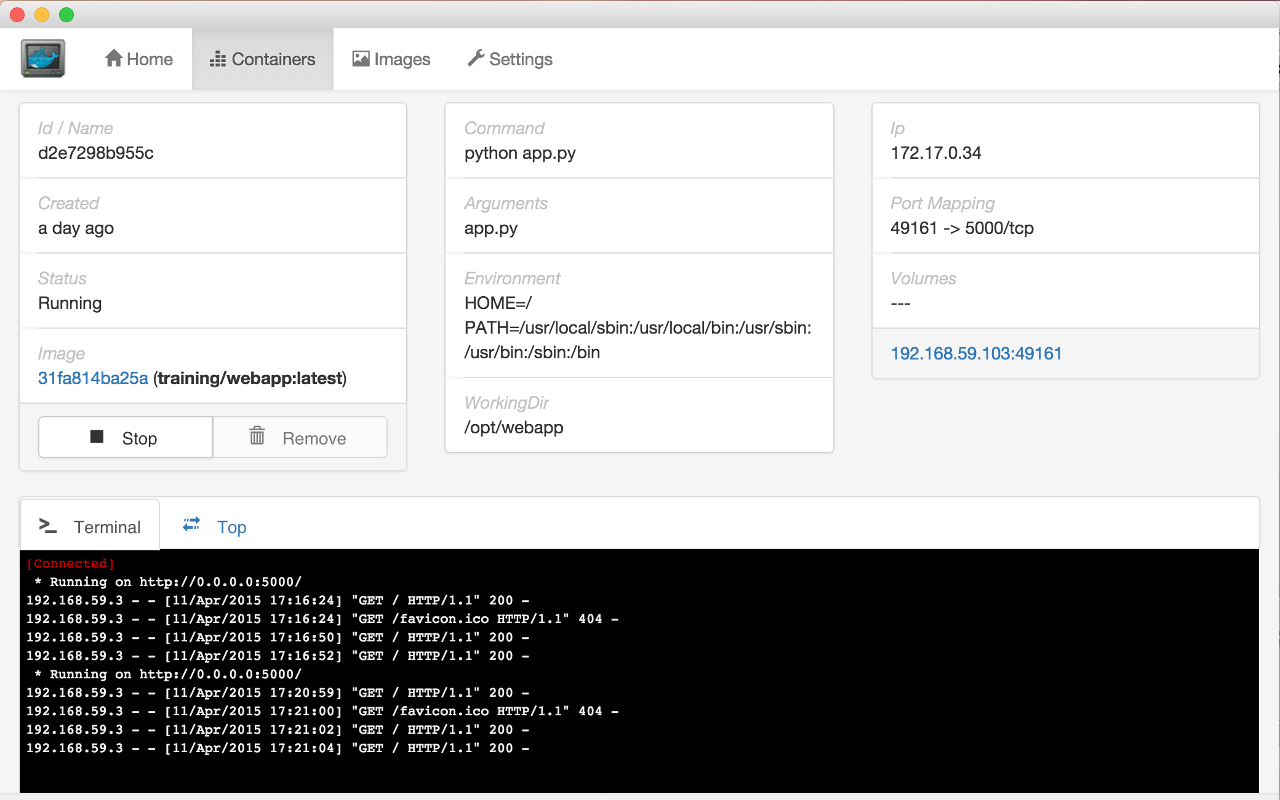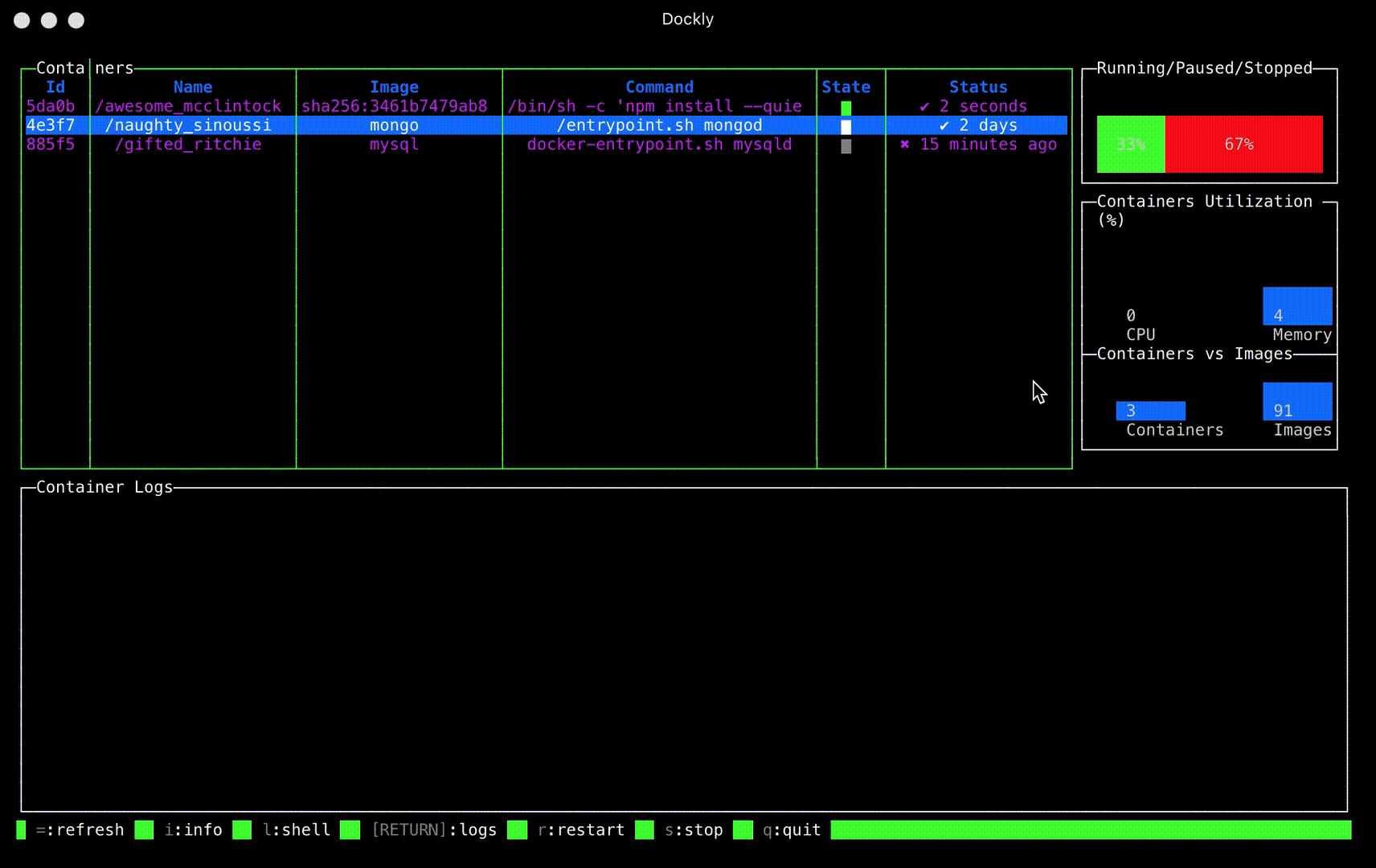Overview of Docker Container Management GUIs

Working with Docker in the console is a routine for many. However, there are times when a GUI / web interface can be useful even for them. The article provides an overview of the most notable solutions to date, the authors of which tried to offer more convenient (or suitable for some cases) interfaces for getting to know Docker or even serving its large installations. Some of the projects are very young, while others, on the contrary, are already dying ...
Portainer
- Site ; GitHub ; Gitter .
- License: Open Source (zlib License and others).
- OS: Linux, Mac OS X, Windows.
- Languages / platform: Go, JavaScript (Angular).
- Demo version (admin / tryportainer).

Portainer (formerly known as UI for Docker) is the most popular web interface for working with Docker hosts and Docker Swarm clusters. It starts very simply - by deploying a Docker image, which receives the address / socket of the Docker host as a parameter. Allows you to manage containers, images (knows how to take them from the Docker Hub), networks, volumes, secrets. Supports Docker 1.10+ (and Docker Swarm 1.2.3+). When viewing the containers for each of them, basic statistics are available (resource usage, processes), logs, connection to the console (xterm.js web terminal). There are access lists that allow restricting Portainer users the rights to various operations in the interface.
Kitematic (Docker Toolbox)
- Website ( Docker Toolbox + page ); GitHub ; forum .
- License: Open Source (Apache License 2.0).
- OS: Mac OS X, Windows.
- Languages / platform: Electron, Node.js, React and AltJS.

The standard GUI for Docker users on Mac OS X and Windows, which was included with the Docker Toolbox, a utility set installer that also includes the Docker Engine, Compose, and Machine. It has a minimal set of functions for loading images from the Docker Hub, managing basic container settings (including volumes, networks), viewing logs and connecting to the console.
Shipyard
- Site ; GitHub .
- License: Open Source (Apache License 2.0).
- OS: Linux, Mac OS X.
- Languages / platform: Go, Node.js.

Shipyard is not just an interface, but a Docker resource management system based on its own API. Shipyard's RESTful API based on the JSON format is 100% compatible with the Docker Remote API and offers additional features (in particular, authentication and access list management, logging of all operations performed). This API is the base around which the web interface is already built. Shipyard uses RethinkDB to store service information that is not directly related to containers and images. The web interface allows you to manage containers (including viewing statistics and logs, connecting to the console), images, Docker Swarm cluster nodes, private registries (Registries).
Admiral
- Site ; GitHub .
- License: Open Source (Apache License 2.0).
- OS: Linux, Mac OS X, Windows.
- Languages / platform: Java (VMware Xenon framework).

A platform from VMware designed for automated deployment of containerized applications and their management throughout the life cycle. Positioned as a lightweight solution designed to simplify the life of DevOps engineers. The web interface allows you to manage hosts with Docker, containers (+ viewing statistics and logs), templates (images integrated with the Docker Hub), networks, registries, policies (which hosts will be used by which containers and how to distribute resources). Able to check the status of containers (health checks). Distributed and deployed as a Docker image. Works with Docker 1.12+. (See also the introduction to the program on the VMware blog with a lot of screenshots.)
Dockstation
- Site ; GitHub (without source code) .
- License: proprietary (freeware).
- OS: Linux, Mac OS X, Windows.
- Languages / platform: Electron (Chromium, Node.js).

DockStation is a young project created by Belarusian programmers (who, incidentally, are looking for investors for its further development) . The two main features are a focus on developers (not DevOps engineers or system administrators) with full support for Docker Compose and closed code (free to use, and for money, authors offer personal support and refinement of features). It allows you to not only manage images (supported by the Docker Hub) and containers (+ statistics and logs), but also start projects with visualization of container connections involved in the project. There is also a parser (located in beta) that allows you to convert commands
docker runto Docker Compose format. Works with Docker 1.10.0+ (Linux) and 1.12.0 (Mac + Windows), Docker Compose 1.6.0+.Simple docker ui
- GitHub .
- License: Open Source (MIT License).
- OS: Linux, Mac OS X, Windows.
- Languages / platform: Electron, Scala.js (+ React on Scala.js).

A simple interface for working with Docker using the Docker Remote API. Allows you to manage containers and images (with support for the Docker Hub), connect to the console, view the history of events. Has mechanisms for removing unused containers and images. The project is in beta and is developing very slowly (real activity, judging by the commits, subsided in February this year).
Other options
Did not get into the review:
- Rancher is a container management platform with orchestration features and Kubernetes support. Open Source (Apache License 2.0); works on Linux; written in Java. Has a Rancher UI web interface on Node.js.
- Kontena is a "developer-friendly platform for launching containers in production", essentially competing with Kubernetes, but positioned as a more out-of-the-box and easy-to-use solution. In addition to the CLI and REST API, the project offers a web interface ( screenshot ) for managing the cluster and its orchestration (including working with cluster nodes, services, volumes, secrets), and viewing statistics / logs. Open Source (Apache License 2.0); works in Linux, Mac OS X, Windows; written in Ruby.
- Data Pulley is a simple utility with a minimum of features and documentation. Open Source (MIT License); works on Linux (there is only a package for Ubuntu) ; written in Python. Supports Docker Hub for images, viewing logs for containers.
- Panamax is a project with the goal of “making deploying complex containerized applications as easy as drag-n-drop.” For this, we created our own catalog of templates for the deployment of applications ( Panamax Public Templates ), the results of which are shown when searching for images / applications along with data from the Docker Hub. Open Source (Apache License 2.0); works in Linux, Mac OS X, Windows; written in Ruby. Integrated with CoreOS OS and Fleet Orchestration System. Judging by the activity visible on the Internet, it was no longer supported in 2015.
- Dockly is a console -based GUI for managing Docker containers and images. Open Source (MIT License); written in JavaScript / Node.js.
Finally: what does the GUI look like in Dockly? Caution, 3.4 MB GIF!

PS
Read also in our blog:
